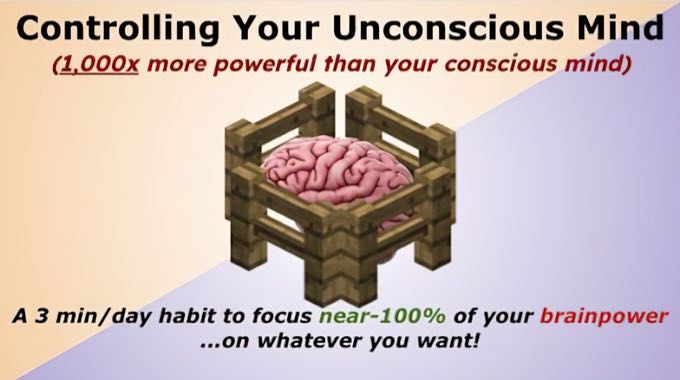.
Source: Colin Galen (click to check out more videos about maximizing your brain power)
In this video, Colin Galen discusses how to control the raw power of the unconscious mind and get it to focus on what you want. Colin explains that the unconscious mind is responsible for intuition, insight, and creativity, and is much more powerful than the conscious mind. Successful people know how to focus this power on their goals. The key to controlling the unconscious mind is to get it to care deeply about what it is you are trying to accomplish. Colin recommends associating your task directly with happiness and using Pavlovian conditioning to condition yourself to recognize that your task will directly lead to your key motivator. This can be achieved through a habit of conditioning yourself to feel these emotions while doing the task for a few minutes a day. You can also use negative emotions about how you will feel if you don’t complete the task.
TRANSCRIPT
Hi. Your unconscious mind is absolutely cracked. Seriously. It controls so many of your most powerful brain processes: intuition, Insight, most of creativity, and basically the vast majority of the thinking you do all goes on in the background. Some have claimed your unconscious mind is hundreds or thousands of times more powerful than your conscious mind. And I would say one of the biggest advantages that successful people have is that they know how to focus this incredible source of brain power on whatever they’re trying to accomplish.
There’s a famous post by a former world number one competitive programmer that claims the same thing. The best people are all able to think about things passively, even during random tasks like showering or skydiving, and keep their unconscious mind focused on the tasks they’re trying to figure out.
So you may be asking now: how do you do this too? How do you control the raw power of your unconscious mind and get it to listen to you?
I’m going to offer you a habit. Something easy in fact. Something you only have to do for a few minutes a day to keep your unconscious mind focused on what you want. But despite its simplicity, it’ll work very well because it draws upon what drives your unconscious mind in the first place, and that sounds really nice. It is really nice, so enjoy the video.
But first, let me tell you who I am. All my points are going to be logical, but it’d be good if you can trust my experience too. So I’m one of the world’s best competitive programmers. That means problem-solving. And I had an extremely quick rise to the top, and probably the biggest reason for this is that my unconscious mind was extremely invested in my success. Because, even when I wasn’t consciously thinking about problems, my unconscious mind was churning out ideas in the background and constantly rewiring itself to get better and better at problem-solving because it cared so much about improvement. And the hardest problem I ever solved in a contest was solved through Insight, which is when you’re unconscious mind, out of nowhere, gives you a really good idea. In fact, I personally kind of lost interest in the problem. I thought it was too hard for me. But my unconscious mind stayed focused and cooked up ideas in the background, and eventually gave me a really good idea that ended up being correct. So my unconscious mind is very much on my side. And after this video, you’re going to learn how to set that up for yourself too.
But before we start that, let me give a bit of info on what the unconscious mind is and does for us. And I’m not going to make this sciency, so don’t worry about technical stuff – just some basic facts.
So what’s important for this video is that your unconscious mind is a background process, something you don’t have conscious control over. So, by default, it’s doing random things like regulating your body temperature and making sure you’re still breathing, that you’re breathing manually now that I mention it. You’re welcome.
[00:02:13]
And it’s unbelievably powerful. Just think about how much your body does automatically things you don’t, even realize are happening. Even a fraction of that raw power can be incredibly helpful to you.
Like, let’s do a speed test. Add two and three that was instant right? Probably before I even finished the sentence, that’s because the task was so simple. Your unconscious mind just decided to handle it for you. Now add these two numbers: 648 + 271. Probably not so instant, right? You can break it down into a bunch of easy parts that your unconscious mind can handle. But it probably can’t do the whole thing. And that’s because you probably don’t have the addition algorithm ingrained in your head.
So what you had to do is consciously perform the steps of addition with carrying and such and feed those smaller tasks to your unconscious mind to handle. But that was orders of magnitude slower because your conscious mind is weak.
So you want your unconscious mind to do as much for you as possible. And it’s capable of a lot of complex thinking, such as offering insights and intuition, but only when it’s interesting enough. And there’s a comment on my social media that summed up all my points better than I could. Basically, your unconscious mind is this Ultra powerful computer and your Consciousness is like the keyboard telling that computer what to do. And that’s pretty much what’s happening here.
Your goal is to give your unconscious mind the task of helping you with whatever you’re trying to do. You may have to simplify your task. You may have to break it into smaller pieces, But ultimately you want your unconscious mind to focus its power on your task. And the tricky bit is: it’s usually not necessarily just try the task. For some people it is. And we’ll cover why very soon. But for most people, you have to do some extra work to get your unconscious mind really invested in it.
And finally, now we’ll talk about how you do that. So now the question becomes: how do you control your unconscious mind and give it a task for it to focus all its power on? And the key is to get your unconscious mind to care about something.
And this will sound very dumb, but to get your unconscious mind to care about something, the only thing you have to do is to care about that something. But I don’t just mean caring. I mean CARING – like loving something so much that just doing it brings you significant happiness by default. Or, on the other end of the spectrum, caring so much that if you fail at something you feel like you’re very survival is threatened. You feel genuinely afraid of failure.
And these are things that your unconscious mind can recognize – happiness, fear, survival – very basic, primal, fundamental human nature, emotions that result from your caring. Your unconscious mind wants to be happy. If you get good at your task or even just do your task you’ll be happy.
Therefore, your unconscious mind will focus on the task. Doing what you love is one easy way to accomplish that. If you fail the task, your survival will be threatened. Your unconscious mind doesn’t want that. So we’ll focus on not failing the task. And nothing artificial will work, there’s no inherent primal value in money or prestige or success or any of the things that motivate most people. Your unconscious mind just doesn’t care and therefore it won’t try to help you.
So if that’s what you’re working for, you’re going to have to turn these artificial motivators into primal emotions. That your unconscious mind will care about. So let’s get into exactly how you do that.
Let’s start with an idea: I’ve dubbed the chain of motivation. So, let’s imagine a conversation with someone who’s studying computer science. They’ll say I want to study computer science. I’ll ask why they’ll say something else. If their answer is that they love it, then they’ve already won over their unconscious mind, but they probably won’t say that.
So, let’s imagine what else they can say. For example, they can want a good job. And I’ll ask why?
And they can say so they can earn a lot of money. And I’ll ask why?
And this can again branch into a bunch of different reasons. Let’s imagine a common scenario, they would say they want to support their family. So I can again ask why?
And maybe this is the point where it becomes about happiness or love or emotional connections or whatever. Eventually, it will reduce the sum set of primal emotions or nothing at all. And if it reduces to nothing, then you should seriously consider why are you doing this at all, What’s the point? If there’s no benefit, are you really just wasting your time?
If you don’t get anything out of your thing, this method won’t help you. But at the same time, if you don’t get anything out of it, the thing might not be helping you at all. So really consider that.
But if it does lead to some primal emotions, then your goal should be to focus on those. And let’s call these primal emotions your key motivators – things that your unconscious mind recognizes and will focus on. In the ideal scenario, you love what you’re doing and therefore your key motivators are right next to you. That means your unconscious mind is, by default, focused on those key motivators and therefore also on the thing you’re trying to do. So you win.
But if you’re watching this, that’s probably not the case. Your case probably looks like more like the hypothetical CS (computer science) student. So you want to turn your case into the ideal case. And how do you do that?
Well, as an example, try to visualize yourself achieving your goals. For example, having a lot of money, being able to buy nice things, etc. It’s nice, right? Probably brings you good feelings. Just think about how happy you’d be if things worked out for you. Let that happiness bleed into the present.
So what you ultimately want to do is associate your task directly with those good feelings. Skip the long chain of because… This is what I want. This task is how I get there – nothing in between. Burn that association into your head.
You’ve probably heard of Pavlovian conditioning. By using a metronome to signal the arrival of food, Pavlov got dogs to salivate just by hearing the metronome, since, ultimately they form the associate station between the metronome and the food. That’s ultimately your goal here.
[00:07:02]
You want progress on this task. For example, a success to directly associate with happiness. And your unconscious mind will recognize this association, since it has to do with the key motivator.
And on the other end, you can also try to get failure to associate with negative emotions. And this is a risky game because you can make yourself unhappy. But it will probably let you be even more focused since your unconscious mind will work on avoiding those negative emotions.
So I promised you a habit, something you can do for only a few minutes a day. What can you do to make this conditioning happen? And the first thing you have to do is figure yourself out. So on day one, take some time out to figure out how your motivation works. Have the why conversation with yourself. Inspect your motivation chain, like literally, draw out this diagram if you need to. Understand what drives you. Figure out what your key motivators are.
And on the rest of the days, you can work on this conditioning. You want to get rid of the stuff in the middle, so embrace Pavlov. Start doing your task and while you’re doing your task, think about whatever your key motivator is. Imagine success. Imagine yourself getting what you want, imagine happiness. Or imagine, failure and dread if you don’t succeed in the task.
Make yourself feel these positive or negative emotions, while you’re doing the task so that those emotions get associated with the task. Again, nothing in between. Ignore the rest of the motivations in the chain. Just your task and the key motivator. Condition yourself to recognize that your task will directly lead to your key motivator.
In a similar vein, you can reward or punish yourself for success and failure. Doing that will give yourself a direct, short-term way of feeling those emotions as a result of your task. And also visualize that reward or punishment while doing the task, so you can associate those emotions with progress.
And that’s the habit. Spend a few minutes a day conditioning yourself. You don’t need to do it for a long time. There are diminishing returns anyway. You can do it multiple times a day or as often as you feel like. And the more time you put in, the faster your unconscious mind will recognize your goal. But you don’t have to do it that often for it to work. Just do it consistently. And that’s all you really need to do convince your unconscious mind to care by associating your task with primal emotions that it cares about.
Mental change is achieved through repetition. So do this daily and you’ll see results fairly quickly, just as Pavlov did.
Some other things to note: ego can be a very good key motivator. So let’s do out an example. What’s my motivation chain, how does this work for me? So why do I do competitive programming?
There are a lot of reasons. For one, I love problem solving and I also love coding. So there’s two good things. But there’s another reason that trumps both those and that’s ego. I did this problem solving stuff, ultimately because I want to prove I’m smart. So any success is a decent ego boost. And any failure makes me feel basically worthless. So obviously my unconscious mind has an incentive to contribute here. And I’ve sort of done this conditioning automatically, but I take any failure very personally.
It hurts to fail – like physically hurts, I would say, I’m that guy that equates failure with threatening my survival. So my unconscious mind is very invested in my success. It’s not exactly the healthiest setup, but it works very well.
And you should take failure personally too. For example, suppose you can’t learn something or you can’t get good at something or whatever. How can you let this minuscule task make a fool out of you? It should bother you that you can’t accomplish this, I mean others probably have. You should take it personally. Take it as a hit to your Ego. Then your unconscious mind will want to preserve your ego, so it’ll help out.
A couple other things. Get this conditioning set up and make your task associated with happiness, but then don’t waste it. Don’t like go out of your way to do easy tasks to get quick, dopamine hits. You should still do hard things. Do what you would normally do and do the tasks normally, but just add in this conditioning every once in a while. Don’t try to game your own system and create artificial happiness, because that’s not productive and won’t get you anywhere.
And finally, one easy trap to fall into is feeling entitled to success. But don’t. No matter what, you still have to work for your goals. If you feel entitled, you’ll naturally lose interest in the goal and so will your unconscious mind. So block those feelings out. Don’t give them any space in your mind. Stay focused on your task and your goal.
To finish up – not that much to say. Like I said, you can do this for a few minutes at a time. You can do it multiple times a day, probably for better effect, but you don’t have to do it for that long at a time. And you should do it for a while, keep the association strong, and don’t let it go away. This will make a world of difference in your life, so keep it up.
If you happen to already be doing what you love, this won’t help you, because if you love it your unconscious mind will love it too. But I suspect that’s not the case for the vast majority of people. And that’s why this video exists – to help those with other forms of motivation recognize that they need a more direct connection for their unconscious mind to get involved.
What else? This is a different style of video, or at least the title is. I realized that a large issue with my recent videos has been originality, so I’m trying this out to present something new for everyone. And I hope it works, but we’ll see. And I suppose that’s it. So that’s all. Goodbye







